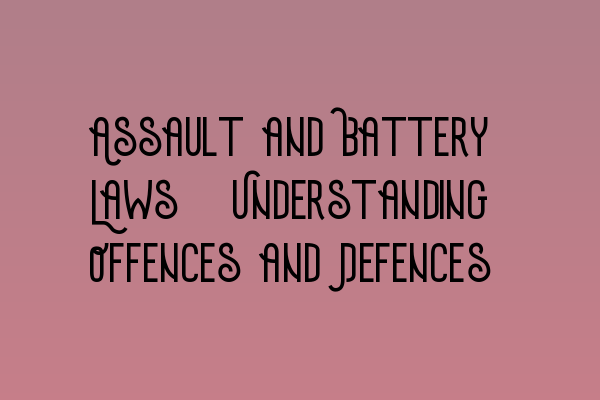Assault and Battery Laws: Understanding Offences and Defences
Welcome to SQE Criminal Law & Practice Law UK, your trusted source for legal information and assistance. In this blog post, we will delve into the intricacies of assault and battery laws, providing a comprehensive understanding of these offences and the possible defences available.
What is Assault?
Assault is a criminal offence that involves the intentional act of causing someone to apprehend immediate and unlawful violence. It is important to note that assault does not require the actual physical contact; the mere act of causing fear of violence is sufficient to constitute assault.
There are various forms of assault, including:
- Common assault: This refers to the most basic form of assault where no additional factors are present.
- Aggravated assault: This involves assault committed with the use of a weapon or resulting in serious physical harm.
- Assault causing actual bodily harm (ABH): ABH is a more serious offence which includes the infliction of physical harm short of grievous bodily harm.
If you are looking to test your knowledge of assault and other criminal law topics, we recommend taking the SQE 1 Practice Exam Questions offered by SQE Criminal Law & Practice Law UK. This will help you prepare for any upcoming assessments or examinations.
The Elements of Battery
While assault involves the fear of immediate violence, battery refers to the intentional and unlawful application of force on another person. Battery requires physical contact, unlike assault.
It is necessary to establish the following elements to prove battery:
- Intention: The defendant must have intended to make physical contact or apprehended the risk of such contact.
- Unlawful physical contact: The contact must be non-consensual or without lawful justification.
If you are preparing for your SQE examinations, take advantage of our comprehensive SQE 2 Preparation Courses. These courses are tailored to help aspiring solicitors excel in their educational pursuits and develop a strong foundation in criminal law and practice.
Defences to Assault and Battery Charges
When facing assault or battery charges, it is essential to explore any potential defences that may be available. The following defences may apply:
- Self-defence: This defence arises when the defendant can demonstrate that their actions were necessary to protect themselves or others from immediate harm.
- Consent: If the alleged victim consented to the physical contact, it may serve as a defence.
- Lack of intent: If the defendant can establish that they did not possess the required intent for assault or battery, it can be a successful defence.
For those preparing specifically for the SQE 1 examinations, we recommend practicing with the SQE 1 Practice Mocks FLK1 FLK2. These mock quizzes provide a realistic experience and help you familiarize yourself with the format and content of the actual examination.
Stay Informed with SQE Criminal Law & Practice Law UK
As legal professionals, it is crucial to stay up-to-date with the latest developments in the field. Stay connected with SQE Criminal Law & Practice Law UK for regular updates, analysis, and insights into criminal law matters.
For more information on SQE 1 and SQE 2 exam dates and preparation, visit our SRA SQE Exam Dates page. We offer comprehensive preparation courses for both SQE 1 and SQE 2 to ensure you are well-equipped for success.
Thank you for choosing SQE Criminal Law & Practice Law UK as your trusted legal resource. We are committed to providing valuable information and support to help you navigate the complexities of criminal law.
